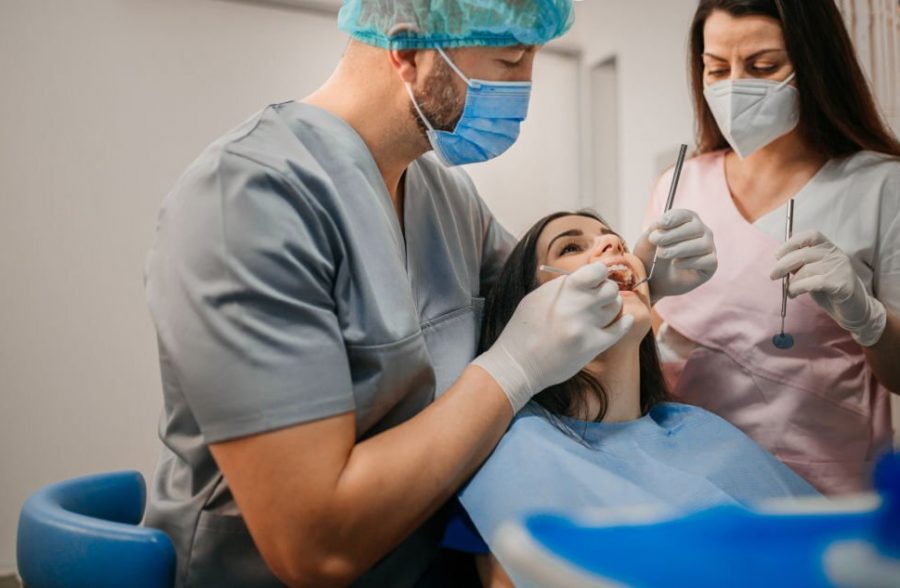Chipped teeth, gum decay, and gum disease are among the most common dental emergencies you can encounter at any time.
While good oral health and adequate dental care are the best ways to avoid such emergencies, knowing what to do during such incidents can help prevent long-term damage.
Understanding the situation and availing the right treatment option before dental emergency services can effectively save someone’s life (in specific conditions). Keeping the same in mind, we’ve covered some common emergency dentist treatments everyone should know of.
Continue reading as we list some common emergency dental procedures in the following sections, giving you insight into treatment options. Let’s get started.
Common Emergency Dental Treatments
Emergency dental procedures at your dentist are designed to restore your oral health, alleviate pain, and address the underlying issue in most cases. In this section, we’ve listed some standard emergency dental procedures that your professional may perform.
1. Tooth Extraction
Tooth extraction is a typical immediate dental care option for teeth that are seriously damaged, diseased, or causing excruciating pain.
In such dental emergencies, your dentist will carefully remove the injured or damaged tooth while ensuring you’re comfortable the entire time. After the tooth is extracted, your dentist may give aftercare instructions and undergo tooth replacement options, including dental implants or bridges.
Why Tooth Extraction May Be Necessary?
There are several reasons why a tooth extraction may be necessary, including:
- Tooth decay is too severe to be treated with a dental filling or a root canal.
- Advanced gum disease that has severely damaged the tooth’s supporting structures.
- Wisdom teeth have become impacted and are causing pain or other dental difficulties.
- Preparing for orthodontic treatment that may need greater mouth space.
Don’t feel left out if your dentist in Branson, Missouri, asks you to undergo an extraction. Dentistry has come a long way, and contemporary procedures and anesthetics guarantee that the treatment is painless and comfortable.
2. Root Canal Therapy
Root canal therapy, commonly known as endodontic treatment, saves a tooth that has become diseased or badly decaying. During this emergency dentist surgery, the dentist removes the diseased pulp inside the tooth, cleans the root canals, and closes them to avoid reinfection during this treatment.
Dentists under dental emergency service generally prefer root canal therapy if your tooth is beyond saving or has problems concerning the roots of your jawbone. Following the root canal, a dental crown usually strengthens and protects the tooth.
Signs You May Need a Root Canal
Several signs may indicate the need for a root canal, including:
- Constant toothache, particularly while biting or eating.
- Temperature sensitivity (both hot and cold).
- Gum swelling and discomfort near the damaged tooth.
- A little pimple-like lump near the teeth on the gum.
Ignoring the possible symptoms of a root canal may result in additional illness and tooth loss before you reach out to emergency care dental. Therefore, consult your dentist immediately once you see any of these symptoms.
3. Abscessed Gums Or Teeth
Bacterial invasion of the dental pulp, which includes the tooth’s nerves and blood vessels, causes abscessed teeth or gums. The infection may extend to the root, causing pain, inflammation, and an unpleasant odor. The infection might progress to an abscess visible on the gum’s surface.
Antibiotics may be sufficient to treat an infection in most cases of abscessed gums. However, your emergency dentist in Branson, MO, may also advise a root canal to remove the abscess and drain the infection. It is critical to see a dentist as soon as you notice indications of an abscess.
Antibiotics may be necessary in the following situations:
- A severe tooth or gum infection is accompanied by fever, swelling, and spreading pain.
- An abscess that is causing severe pain and swelling.
- Dental infection poses systemic health hazards.
If opting for antibiotic treatment, it’s important to finish the whole course of antibiotics given by the emergency dentist. This ensures complete eradication of the infection.
Those mentioned above were some of the most commonly opted dental emergency treatments. But since prevention is better than cure, we’ve listed some basics that could help you minimize dental emergencies.
Basics Of Preventing A Dental Emergency
Use A Mouthguard
Do you enjoy sports? Show your enthusiasm for the game without risking your flawless smile.
Avoid immensely physical games that can cause mouth and facial injuries or knock out a tooth. What’s more? You could also protect yourself from unwanted dental emergencies by wearing a mouthguard to the game.
Watch What And How You Eat
Human teeth are tough, yet you’d be shocked at how easily they may be chipped or cracked. Hard sweets and difficult meats are just a few of the things that can break otherwise strong, straight, and attractive teeth.
To avoid this, simply take a moment before you bite. Don’t think about satisfying your sweet tooth. The risk of tooth chipping on top of sugar-related cavities is not worth it.
Don’t Chew On Hard Food Items
Many people have oral obsessions, such as chewing on pen caps, their nails, or other non-food items. But did you know that such unhealthy practices could cause your teeth to chip or break?
You may end these unhealthy behaviors by keeping your hands busy and including zero-sugar gum to divert mouth fixations. This method will also allow you to increase saliva production and cleanse microorganisms.
Conclusion
This brings us to the end of our blog on the treatments provided by emergency dentists. So now that we know the type of treatment options and some cautionary measures to prevent it, how prepared are you?
We’re Ready For You!
At Branson Dental Center, we’re more than ready to guide you through your dental emergencies. Our state-of-the-art facility and trained staff help you every step of the way. Visit our clinic and experience the change today.

